As Saint Josemaría Escrivá writes, the priest – whoever he may be – is always another Christ…
At a time of suffering, the Lord wants you to make His presence known through your ministry….
With Him on board, even at most difficult of times, you, and His Church, will not be ‘shipwrecked’…
These are just some of the words of encouragement from Pope Francis and Cardinal Pietro Parolin to 29 new Opus Dei priests on Saturday, Sept. 5, 2020, in Rome.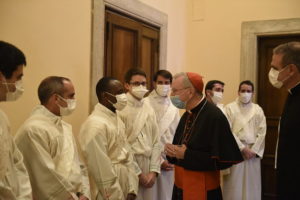
Within hours of returning from two epic days in Lebanon on the Pontiff’s behalf, Cardinal Pietro Parolin, Vatican Secretary of State, ordained the new priests in the Basilica of Saint Eugene early the next morning. At the start of the ceremony, he read a letter from the Pope, and then later, in his homily, he warmly encouraged these individuals to be good shepherds, along with some practical advice.
INTERVIEW: #Cardinal #Parolin Returning From #Beirut: ‘I Felt Pain of #Lebanon & Saw #Apocalyptic #Destruction’
Morning After Returning, #Vatican #Secretary of #State Presides Over #Ordination of 29 New #OpusDei Priests in #Rome @opusdei @opusdei_eshttps://t.co/ydajd06reF
— ZenitEnglish (@zenitenglish) September 5, 2020
Through Your Ministry, Lord’s Presence
In a letter, the Holy Father congratulated the 29 priests and their families, lamenting that due to the health emergency, many could not be present at the ordination.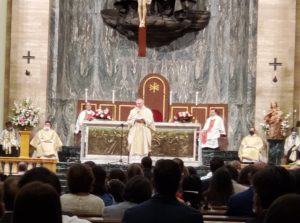
“I ask the new priests to consider, along with the great gift of the priesthood, the meaning of receiving it precisely in these moments of so much pain in the world,» he urged, noting, that at such a time, one especially senses the presence of «the suffering and merciful Christ.»
«The Lord,» Francis said, «wants this presence to be made a reality through your ministry.»
«Just like the disciples, we will experience that, with Him on board, we will not be shipwrecked,» the Holy Father underscored. And this is because of God’s strength, he said, that can «turn into something good everything that happens to us, even what is bad.”
The Holy Father concluded by asking the new priests that “through their union with the Pope, they may always make that aspiration of Saint Josemaría a reality: ‘All, with Peter, to Jesus through Mary.’”
The Argentine Pope also sent his “affectionate greetings» to Prelate of Opus Dei «dear Monsignor Fernando Ocáriz,» along with his wish «that the Lord may continue helping him to fulfill his faithful and joyful service to the Prelature and the entire Church, especially in this year of preparation for his priestly jubilee.”
Priest, Always ‘Another Christ’
Cardinal Pietro Parolin presided over the ordination, full of socially distant families of the new priests. Many young children and babies were present.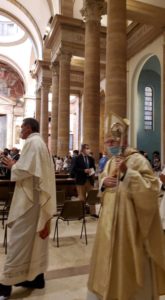
In his homily, Cardinal Parolin reflected figure of the good shepherd, who inspires each priest to be “a source of life, of mercy, of simplicity.”
Being a shepherd, he underscored, «does not consist in a series of tasks but in a way of life.”
“The ministry you are undertaking, dear ordinands, involves your whole life, never forget it,” he said.
«You are not,» he said, «called ‘to do things but to give and share your life, and thus you will be able to fully carry out the call to act ‘in the person of Christ.’”
Thus, he encouraged, “you will be able to embody the ‘style of Jesus.’ Because as Saint Josemaría Escrivá writes, the priest – whoever he may be – is always another Christ.”
Heart Fully Dedicated to God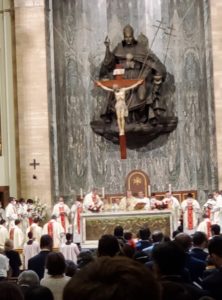
Being a shepherd requires, he said, being a witness to mercy.” “I know how much importance you give to the sacrament of reconciliation in your life and I can only exhort you to continue doing so, to be dispensers of the Lord’s grace and forgiveness: today’s world has such great need of this.”
Before exhorting others, he reminded, always proclaim the beauty of salvation, noting «this beauty attracts us to then live a moral life at the height of the call.”
Another characteristic of the shepherd, the Cardinal said, is simplicity, namely simplicity «born from the transparency of prayer and is manifested in concrete options,» such as “leading an orderly life, without getting caught up in a thousand different things, which could jeopardize the simplicity of a heart fully dedicated to God.”
Finally, the Cardinal referred to the need to bear in mind the mission of “bringing to all men and women the voice of the good shepherd, so that they feel loved by Christ.”
“The Church,» Cardinal Parolin reassured, «is accompanying you; we are all accompanying you with our prayer. And the Church thanks you for your ‘yes,’ the offering of your whole life.”
Opus Dei Prelate — Thank You for Having Collaborated with God
The Prelate of Opus Dei, at the ceremony’s conclusion, thanked Cardinal Parolin for being present.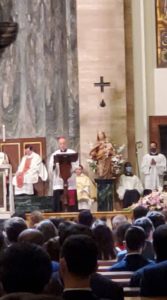
Recalling the Vatican Secretary of State’s visit to Lebanon, the prelate said: “His presence here immediately leads us to that of the Holy Father Francis, who sends his Apostolic Blessing to the new priests, their families and all those present at this celebration.»
«Let us continue supporting the Pope and those who assist him with our prayer,” he encouraged.
The prelate then addressed the parents of the new priests with words of gratitude.
“Thank you for having collaborated with God to make the vocation to the priesthood take root in your children,» he said.
«May God, also through your prayer,» the Prelate of Opus Dei prayed, «fill with fruit the priestly ministry that your children will carry out from now on, with the motherly mediation of Holy Mary.”
New Priests…
A press release from Opus Dei gave some insight into the newly ordained priests.
Andrej Matis, 31, now is the first priest of the prelature from Slovakia. Before studying theology in Rome, Andrej was a professional musician and worked for several years as a violinist in the Mucha chamber music quartet, performing in concerts throughout Europe.
“Beauty can open up doors and sometimes show people the right path in life,” he says. “I too thought that these considerations were just nice words, but I’ve changed my mind.”
Another of the new priests is the young Chilean doctor Juan Esteban Ureta, 37, who worked as an internist in a medical center in Concepción.
Now as a priest, he says, he is excited “to be an instrument so that many people may receive forgiveness and God’s mercy. I would like to learn how to transmit effectively the good news of the Gospel, that we are all loved by Christ.”
Several Africans are among the new priests, such as Andrew Ekemu from Uganda. Born in Kapchorwa in 1981, Andrew studied veterinary medicine at Makerere University in Kampala. He worked for several years vaccinating cows against nagana and treating African marabou at the Uganda National Zoo. While studying theology prior to his priestly ordination, he completed his doctoral thesis on “The Vision of History in the Book of the Prophet Daniel.”
«In Uganda,» he says, «we are a young population, and that is why I ask for your prayers so that many young people in my country may discover the greatness of a life lived close to Christ and in the service of others.”
When thinking about his future as a priest, the Italian Giovanni Vassallo hopes “that in these times of pandemic we may know how to accompany people closely.” Giovanni is a native of Palermo and, before studying theology at the Pontifical University of the Holy Cross, he studied classical philology at the Università della Sapienza in Rome.
For 10 years he was part of the management team of the Residenza Universitaria Internazionale, where university students from many countries live, while working as a teacher of Latin and literature at a school in Rome.
New priest, Roberto Vera, of Mexico, thanks God “for the wonderful family in which I was born, where I learned to love Him above all things.”
“God,» he says, «asks me now to be a priest to celebrate Mass, reconcile people to Him through confession, administer the other sacraments, speak about Jesus to others, accompany those who need me and much more. It is a very big mission, so I’m relying on the prayers of everyone reading these words.”
Guillermo Bueno, another of the ordinands, was born in Seville, Spain, in 1983. A Telecommunications Engineer with a degree from the University of Seville, he specialized in Robotics and Automation. Before considering the priesthood, he worked as a teacher and engineer, especially in the development of biometric identification systems. In 2013 he moved to Rome to pursue a doctorate in moral theology at the Pontifical University of the Holy Cross.
“I have as a wonderful example of a priest in Saint Josemaría Escrivá,” says Guillermo, “a man who knew how to serve everyone, and who always strove to love people with Christ’s heart.”
The new priests come from Spain, Mexico, Guatemala, Chile, Uruguay, Ivory Coast, Slovakia, Argentina, Costa Rica, the Netherlands, Uganda, Peru and Italy. These are their names:
- Santiago Altieri Massa Daus (Uruguay)
- Alejandro Armesto García-Jalón (Spain)
- José Luis Benito Roldán (Spain)
- Guillermo Jesús Bueno Delgado (Spain)
- Juan Luis Orestes Castilla Florián (Guatemala)
- José Luis Chinguel Beltrán (Peru)
- José de la Madrid Ochoa (Mexico)
- Andrew Rowns Ekemu (Uganda)
- Pablo Erdozáin Castiella (Spain)
- Felipe José Izquierdo Ibáñez (Chile)
- Kouamé Achille Koffi (Ivory Coast)
- Santiago Teodoro López López (Spain)
- Martín Ezequiel Luque Marengo (Argentina)
- Andrej Matis (Slovakia)
- Carlos Medarde Artime (Spain)
- José Javier Mérida Calderón (Guatemala)
- Claudio Josemaría Minakata Urzúa (Mexico)
- Andrés Fernando Montero Marín (Costa Rica)
- Ignacio Moyano Gómez (Spain)
- Miguel Agustín Mullen (Argentina)
- Miguel Ocaña González (Spain)
- Ricardo Regidor Sánchez (Spain)
- Antonio Rodríguez Tovar (Spain)
- Manel Serra Palos (Spain)
- Juan Esteban Ureta Cardoen (Chile)
- Giovanni Vassallo (Italy)
- Roberto Vera Aguilar (Mexico)
- Juan Ignacio Vergara (Netherlands)
- José Vidal Vázquez (Spain)
The photos above were courtesy of Opus Dei and ZENIT’s Deborah Lubov.
One could watch the entire ceremony here on the Opus Dei website.
***
Below is a ZENIT-provided translation of the full homily of Cardinal Pietro Parolin, Vatican Secretary of State, at the Ordination:
Homily Given at the Ordination of
Opus Dei Presbyters
Sant’Eugenio Basilica
Rome, September 5, 2020
Dear Prelate of the Opus Dei,
Dear Brothers in the Priesthood,
Dear Ordinands,
Dear Brothers and Sisters in Christ,
I greet each of you with warmly and affectionately, grateful for your invitation to this Ordination of 29 priests of the Opus Dei’s Personal Prelature.
We have just heard Jesus proclaim Himself Good Shepherd: in fact, I would like to share some thoughts with you on this.
The idea has rather taken root that the shepherd designates almost exclusively the leading of the flock: the shepherd is certainly he who leads, who, preceding the sheep, points out to them the way, sets the pace, traces the course of what we in fact call “pastoral.” However, a wider perspective emerges in the Gospel. Jesus evidences the difference between the shepherd and the mercenary. As opposed to the latter who interpret their work as a job, the shepherd does not play a role but assumes a style of life. In fact, in those times especially, he was not understood as someone who had a task to be performed, but as one who shared everything with his flock. The shepherd didn’t live as he liked, but as was better for the flock, he was not where he wished to be, but where the flock was. He moved with the sheep and spent every hour of the day and of the night in their company. More than leading the flock, he lived immersed in it.
Therefore, the image of the shepherd seems to refer first of all not to government, but to life. It’s no accident that Jesus characterizes the shepherd as he who gives “his life for the sheep” (John 10:11). The ministry you are about to assume, dear brothers, is a question of life: assimilated to the Good Shepherd, immersed in His flock, you won’t be called, in the first place, to “do something” — perhaps not even that to which you feel more inclined to — but to give and to share your life. Thus you will be able to realize fully the call to act “in persona Christi”: not only in the administration of the Sacraments, but by embodying Jesus’ style, because, as Saint Josemaria Escriva wrote, “the priest — whoever he is — is always another Christ”, (The Way, 66).
Christ the Good Shepherd came to seek us where we were lost, in the dark valleys of sin and of death: He took our sin upon Himself; He suffered our evil; He shared our death, dying on the cross. He redeemed us this way, gathering us with mercy and placing us with love on His shoulders, as Christian art portrayed immediately, in an eminent way, in this city. The life of the priest is called to witness the joy of the encounter between God and us, the joy that God feels in showing us mercy. Saint John of the Cross wrote: ”It is truly a marvel to see the pleasure and joy that the loving Shepherd and Spouse of the soul feels in seeing it rediscovered and placed on His shoulders and Held with His hands in this desired union” (Spiritual Canticle, Manuscript B, Strophe 22,1). To be pastors today means to become witnesses of mercy. “Today is the time of mercy!” — the Holy Father proclaimed in the imminence of the opening of the last Jubilee (Homily, October 25, 2015). So, the grace of the ecclesial today and your existences meet on this day, in the sign of the merciful shepherd that gives his life for the flock.
I’ll try to draw a couple of more practical consequences from this first aspect, inherent to the life of the shepherd, referring to the words and to the forgiveness of the presbyter. The words with which you preach cannot but be words of life. The First Reading has reminded us that preaching always has the kerygma at the center, the perennial and healing novelty of the Death and Resurrection of Christ for us (cf. Acts 10:39-40). It is the foundation of the proclamation: proclaimed always, before exhorting, is the beauty of salvation. In regard to forgiveness, in the Second Reading Saint Paul has reminded us of its absolute prerequisite. Therefore, be ambassadors of mercy, bearers of forgiveness that revives existence, priests that love to dispose brothers and sisters to allow themselves be reconciled with God (cf. 2 Corinthians 5:20). I know how much attention and care you give to the Sacrament of Reconciliation, to Confession: I can do no other than exhort you to continue to do so, to be dispensers of that grace and of that forgiveness of the Lord of which today’s world is in extreme need!
I propose a second word to you, always inherent to the figure of the pastor: simplicity. We think of the shepherds present at Jesus’ birth: they certainly did not represent the cultural apex of the people and they were not the expression carried out of ritual purity, yet they were the first called to receive the Messiah who appeared on earth. We think of the young David that, in as much as shepherd, was not even counted by the father among the ideal sons to be consecrated. But the Lord, who looks at the heart, loves the little ones and seeks the simple.
Saint Teresa of Calcutta, the Saint whose Liturgical Memorial is observed today, can come to our aid. Perhaps you know the “Simple Way” she delineated, tracing in a few words the essential trajectory of the believer: “The fruit of silence is prayer. The fruit of prayer is faith. The fruit of faith is love. The fruit of love is service. The fruit of service is peace,” — simple words to connect each one with the poles of existence: God and others. The first and decisive step suggested by the Saint is to find time every day for silence and to enter in prayer. This constitutive dimension of the believer — “foundation of the spiritual edifice” was defined by Saint Josemaria, not failing to recall that it is “always fruitful” (The Way, 83.101) — it will represent for you also a true and proper opus to exercise faithfully for the whole People of God. Mother Teresa, when approached by a priest dedicated to works of charity, who was in a hurry to speak to her of his commitment and activities, often interrupted him brusquely to ask him: “How many hours do you pray every day?” (A. Comastri, Mother Teresa: A Drop of Clean Water, 2016, 35).
The simplicity, which stems from the transparency of prayer, implies also concrete choices to go to the essential of the ministry. In fact, to be truly such pastors one must have first of all a well-ordered life and this also means not to let oneself be engulfed by a thousand things, with the risk of losing the simplicity of a heart fully dedicated to the Lord. Saint Escriva expressed himself thus: “The Lord knows that giving is proper to those in love, and He Himself indicates to us what He desires from us. He doesn’t care about riches, fruits or the animals of the earth, of the sea or of the air, because everything is His; He wants something intimate that we must offer Him with freedom: My son, give Me your heart. You see, He is not content with sharing; He wants all. He doesn’t seek our things, He seek us, ourselves” (Homily for the Epiphany of the Lord, January 6, 1956).
Life, simplicity and, finally, mission. It’s the third word that I would like to share in connection with the good pastor. He goes in search of the lost sheep: he leaves the fold, and is not content with seeing the crowd of the ninety-nine, but wishes to reach the only one lost (cf. Luke 15:4-7). This heartfelt desire of the Lord also emerges in today’s text: “I have other sheep, that are not of this fold; I must bring them also, and they will heed my voice. So, there shall be one flock, one shepherd” (John 10:16).
You, dear brothers from various latitudes and from different contexts, are being ordained presbyters during a Pontificate that is transmitting to you, in addition to the priority of mercy lived and to the call to evangelical simplicity, the exigency, which can no longer be postponed, of the mission, as the main vocation of the Church. To be a Church going forth means no longer to conceive oneself as an end, but as a means; to take not ourselves but the Lord to the world. It means to be not introverted but extroverted, not anxious to obtain prominence, but to make Jesus known to those, as happens especially in the most secularized contexts, who think that the question of God belongs to the past.
We are called to make the voice of the Good Shepherd heard, that voice that the sheep recognize because they feel themselves recognized by it, that is, loved, as the biblical meaning indicates of the verb to know. This requires to combine pastoral charity and healthy evangelizing creativity, fidelity and flexibility, well-rooted faith and an available heart; it requires to go and encounter, more than
to wait, to accept not reject, the most disquieting and complex questions of today, particularly those of the young generations, often far and sometimes riotous.
It’s difficult to carry on one’s shoulders disordered lives, apparently empty, but it is these sheep that, today, in particular, the Lord desires us to approach.
Concluding, it seems beautiful to me to let ourselves be challenged again by Mother Teresa, or better, from the beginning by the writing that appears on the wall of the Children’s House at Calcutta; “Man is unreasonable, illogical, egocentric. It doesn’t matter, love him.” On that wall appears the overcoming of the logic of walls. There is the invitation to amplify, without fear and without pretexts, the gift of grace that the Lord gives us freely. In fact, to be ministers means to be servants. Dear brothers, if every day you let the voice of the Good Shepherd, who has served you by giving you Himself, vibrate in your heart, sometimes hurting it and challenging it, then, drawn by Him, you will express words and gestures of life, you will become prophets of evangelical simplicity, you will spread renewed mission ardour.
I confide to you that I was truly moved when I heard your answer: ad sum! The Church encourages you, She accompanies you and She thanks you for your yes. May the Good Shepherd, who wills to conform you to Himself, bring to fulfilment what He has begun in you.



